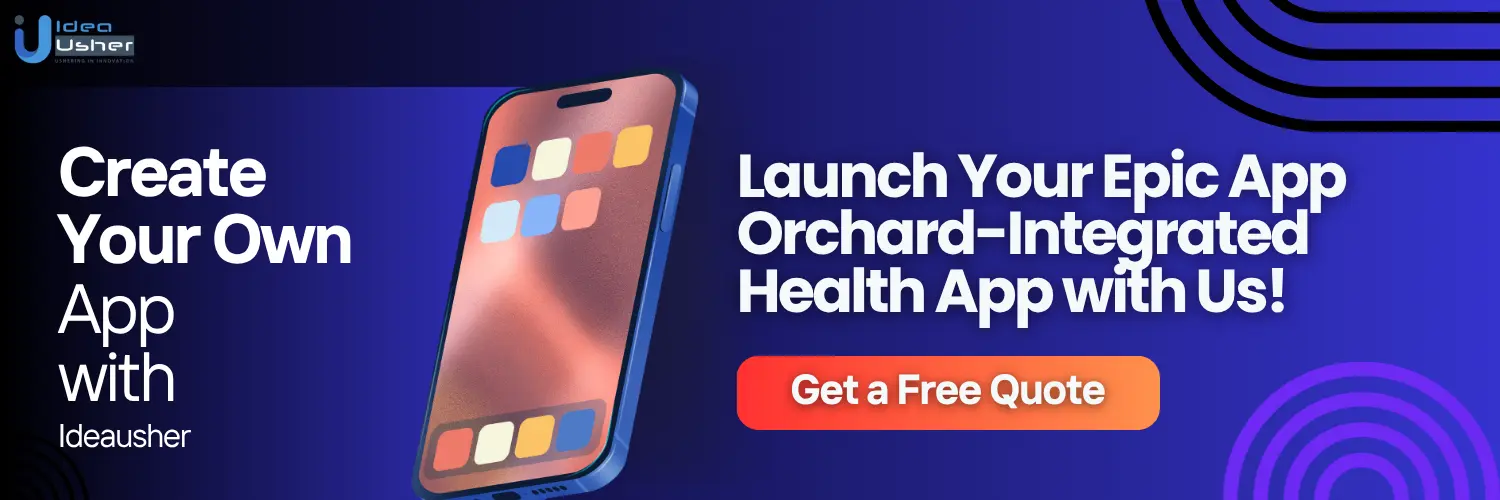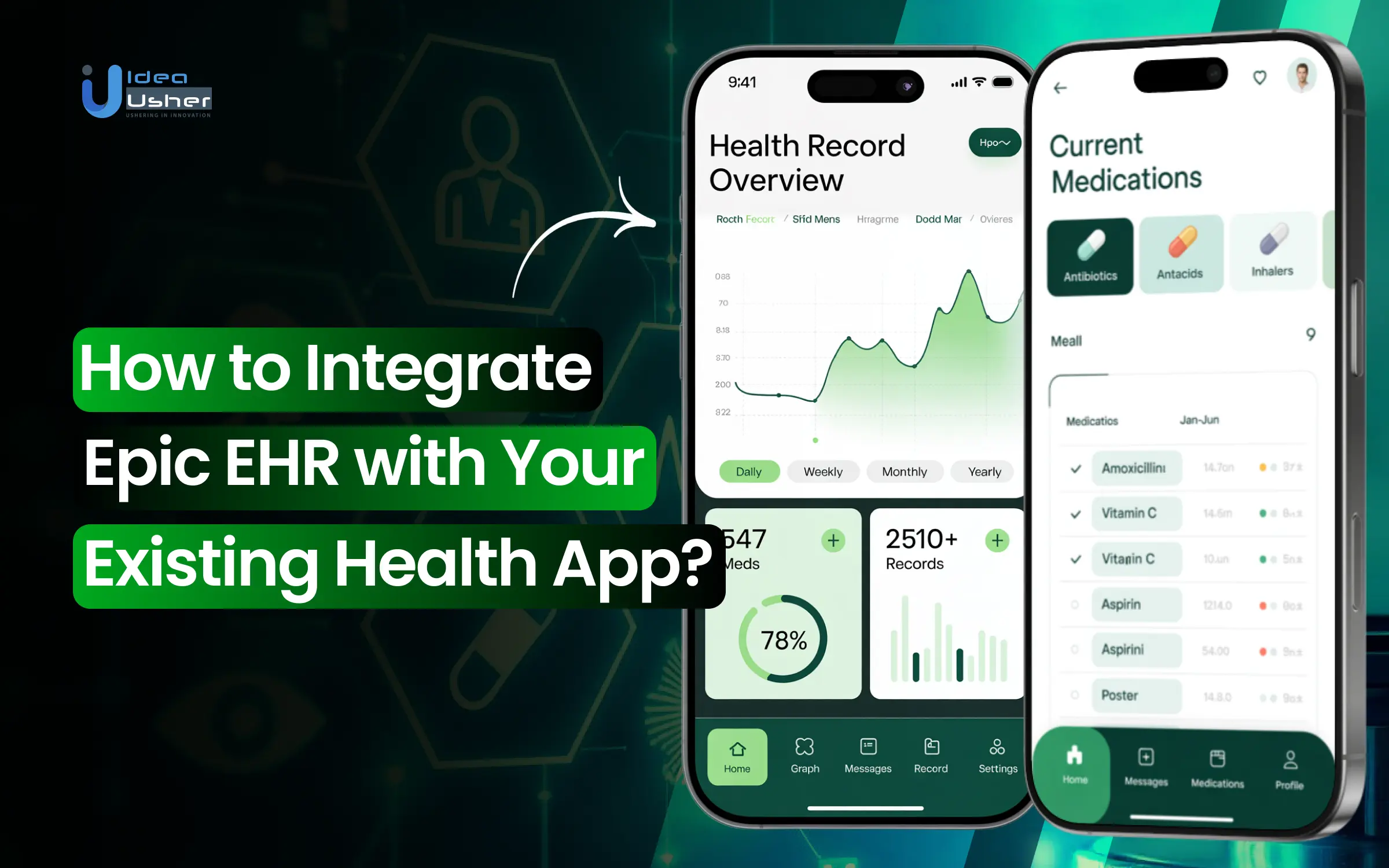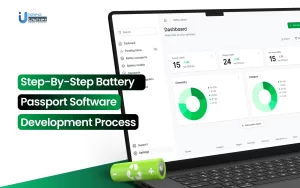Seamless data exchange in healthcare is more than a convenience; it is essential. Patients want their medical information to be available wherever they receive care, and providers rely on unified access to give faster, more accurate treatment. However, many health app developers find it challenging to connect their products to major electronic health record systems like Epic. That’s where Epic App Orchard helps by providing a secure and efficient way to integrate with Epic’s platform.
Epic App Orchard acts as a gateway for developers, allowing apps to connect directly with Epic’s EHR data while meeting strict compliance and interoperability standards. It supports everything from scheduling and patient records to lab results and clinical workflows, making it easier for new apps to improve the Epic experience without causing disruptions.
In this blog, we’ll look at how to connect Epic EHR with your current health app. We’ll cover the technical steps, main requirements, and useful tips to help you achieve a smooth, secure, and scalable integration. We have developed and delivered numerous healthcare apps for different enterprises. IdeaUsher has the expertise to seamlessly integrate Epic EHR with your existing healthcare app, ensuring a smooth, secure, and efficient data exchange that enhances patient care.

What Is Epic EHR?
Epic EHR is a cloud-based, integrated health information system designed to manage various aspects of patient care. It combines the functionalities of Electronic Medical Records (EMR) and Electronic Health Records (EHR), offering a unified platform that supports clinical, administrative, and financial operations within healthcare organizations.
Key Concepts: FHIR, HL7, and SMART on FHIR
These concepts are integral to improving healthcare interoperability, enabling seamless communication and data sharing between different healthcare systems. Understanding their roles is essential for modernizing healthcare technology and enhancing patient care.
FHIR (Fast Healthcare Interoperability Resources):
FHIR is a modern, open standard for exchanging healthcare information electronically. HL7 developed it to improve the interoperability of healthcare systems, enabling easier and faster data exchange.
Core Idea: FHIR is designed around resources, which are individual components of healthcare data (such as Patient, Medication, Observation, etc.). These resources can be used to model and share diverse healthcare information in a standardized way.
Key Features:
- Uses RESTful APIs to enable easy data exchange.
- Supports JSON and XML formats for data transfer.
- Designed to be scalable and adaptable for mobile apps, cloud-based systems, and other healthcare environments.
- Facilitates real-time access to patient data, enabling improved care coordination.
HL7 (Health Level Seven International):
HL7 is a nonprofit organization that develops standards for the exchange, integration, sharing, and retrieval of electronic health information.
Core Idea: HL7 has created numerous standards for healthcare data exchange, with FHIR being one of the most recent and modern frameworks. Prior to FHIR, HL7’s v2 and v3 messaging standards were widely used to exchange health information across systems.
Key Features:
- HL7 v2: A widely used messaging standard for real-time healthcare data exchange (e.g., patient admissions, lab orders).
- HL7 v3: A more complex and structured framework used for managing clinical and administrative data, but it has faced challenges in adoption.
- HL7 CDA (Clinical Document Architecture): A standard for exchanging clinical documents, such as discharge summaries and diagnostic reports.
- HL7 promotes interoperability, making it easier for systems from different vendors to communicate and share healthcare data.
SMART on FHIR:
SMART on FHIR is an open platform that builds on the FHIR standard, enabling the creation of secure, interoperable healthcare applications.
Core Idea: It provides a framework for developing apps that can securely access patient data from any EHR system using FHIR as the underlying data standard. SMART on FHIR uses OAuth 2.0 for secure authentication and access control.
Key Features:
- Facilitates the development of third-party applications that can integrate seamlessly with EHR systems.
- Enables secure access to clinical data, ensuring that only authorized applications and users can retrieve sensitive information.
- Supports app interoperability across different healthcare systems, fostering innovation by allowing apps to work with various EHRs, regardless of the vendor.
- Examples include apps for clinical decision support, patient engagement, and data analytics.
The Role of Epic App Orchard and Epic on FHIR
Epic Systems is a top EHR platform used globally. Epic App Orchard and Epic on FHIR enable secure data exchange and healthcare innovation by supporting developers in creating integrated custom solutions. Here, we explore their roles in modern healthcare.
Epic App Orchard: Empowering Developers and Third-Party Integration
Epic App Orchard is a developer platform by Epic Systems, enabling third-party apps to integrate with the Epic EHR. It offers a secure, standardized environment with tools and resources for developers to connect to Epic’s healthcare data ecosystem, ensuring security and compliance.
Epic on FHIR: Interoperability and Seamless Data Exchange
Epic on FHIR is a key initiative by Epic Systems to facilitate interoperability within healthcare by adopting FHIR (Fast Healthcare Interoperability Resources) standards. FHIR is an open standard for exchanging healthcare information electronically, providing a consistent and interoperable framework for sharing clinical data across different systems and platforms.
Epic App Orchard and Epic on FHIR: A Powerful Combination
Epic App Orchard and Epic on FHIR allow healthcare developers to build, test, and deploy apps that integrate with Epic’s EHR. This enables healthcare organizations to adopt third-party apps with minimal workflow disruption, improving patient care and streamlining operations.
Key Benefits for Healthcare Providers:
- Seamless Integration: With Epic on FHIR and Epic App Orchard, healthcare providers can integrate third-party solutions without worrying about compatibility issues, as these standards ensure seamless data exchange across systems.
- Improved Clinical Outcomes: By integrating apps with Epic EHR data, providers can access enhanced decision support, predictive analytics, and real-time insights, all of which lead to better patient outcomes and more efficient care delivery.
- Scalable Solutions: Epic’s developer ecosystem enables healthcare organizations to scale technology solutions as needs grow. Whether using AI tools, telemedicine, or patient engagement, Epic’s open standards and App Orchard simplify adding innovations without major system overhauls.

Why You Should Integrate Epic EHR into Your Healthcare App?
The global electronic health records (EHR) market size was estimated at USD 28.60 billion in 2024 and is expected to reach USD 43.66 billion by 2034, expanding at a CAGR of 4.32% from 2024 to 2034. This growth is driven by the increasing demand for digital health solutions that enhance patient care, streamline workflows, and improve data interoperability.
Epic Systems, a leader in EHR solutions, reported $4.9 billion in revenue for 2023, up from $4.6 billion in 2022. This impressive revenue growth demonstrates the increasing market adoption of Epic’s EHR platform and its dominance in the healthcare industry.
Suki, an AI-powered digital assistant for healthcare providers, raised $70 million in Series D funding, bringing its total funding to $165 million. Suki’s integration with Epic EHR systems has helped healthcare providers reduce the administrative burden and improve clinical efficiency.
Allscripts, a major provider of EHR solutions, reported $1.8 billion in revenue for 2023. Its integration with Epic’s MyChart enhances patient engagement and makes data more accessible, which leads to improved clinical outcomes and operational efficiency.
Epic EHR’s widespread use and integration make it a strategic choice for improving patient care, workflows, and data exchange. Incorporating Epic into your healthcare app provides access to comprehensive patient data, enabling better decisions. It upgrades your solution to be smarter, efficient, and patient-responsive. As the EHR market grows, integrating Epic offers a competitive edge, enhancing outcomes and operations.
Benefits of Integrating Epic EHR with Your Health App
Integrating Epic EHR with a health app provides technical and business benefits. Epic’s system is widely adopted, enabling real-time data exchange, improved workflows, and compliance. These integrations enhance patient engagement, care, and market position. Here, we explore the technical and business advantages of Epic EHR integration.
A. Business and User Benefits
By offering enhanced patient engagement and ensuring compliance, Epic EHR integration drives retention and gives your app a competitive edge.
1. Enhanced Patient Engagement and Retention
Integrating your health app with Epic App Orchard empowers patients with easy access to their health data and care plans, increasing engagement. Access to real-time information like medication lists and lab results fosters a more interactive experience, improving patient retention.
2. Regulatory Alignment (ONC, HIPAA)
By leveraging Epic App Orchard for integration, your app ensures compliance with HIPAA and the ONC Cures Act Final Rule. Epic’s built-in compliance features and FHIR/SMART on FHIR integration enable your app to meet regulatory standards, minimizing legal risks.
3. Competitive Advantage in the Digital Health Market
Integrating Epic App Orchard gives your app a competitive edge by connecting it with Epic’s vast network of healthcare providers. This interoperability makes your app a preferred solution, positioning it as a top choice in a crowded digital health market.
4. Streamlined Care Coordination for Multi-Provider Systems
With Epic App Orchard integration, your app enhances care coordination across multiple providers. A unified, up-to-date patient record accessible by all healthcare professionals ensures seamless collaboration, reducing redundant tests and improving holistic care across the entire healthcare team.
B. Technical Advantages
Integrating Epic EHR with your health app brings seamless data access and enhances clinical workflows for improved efficiency and accuracy.
1. Access to Real-Time Patient Data
Integrating your health app with Epic EHR through Epic App Orchard enables real-time access to critical patient data such as lab results, vitals, and medication history. This ensures healthcare providers and patients can make timely, data-driven decisions, improving care delivery during both in-person and virtual consultations.
2. Improved Clinical Workflows via Read/Write Capabilities
With Epic App Orchard integration, apps can not only access but also update patient records. This write-back capability streamlines workflows by ensuring data synchronization across systems. Clinicians can seamlessly update medication changes, clinical notes, and treatment plans, reducing manual entry errors and improving efficiency.
3. Seamless Communication Between Providers and Patients
Integration with Epic App Orchard allows healthcare providers to communicate with patients directly through the app, sharing real-time messages, test results, and treatment plans. This enhances patient engagement and ensures better follow-up, fostering stronger provider-patient relationships and ultimately improving health outcomes.

Integration Process of Epic EHR with Your Existing Healthcare App
Integrating your health app with Epic EHR via FHIR and SMART on FHIR requires a structured approach. This guide outlines key phases to ensure seamless connection and compliance, from evaluating readiness to ongoing support.
1. Evaluate Your Platform Readiness
Before we start integrating your health app with Epic EHR, we assess your infrastructure’s compatibility with FHIR. Our developers ensure that your system supports RESTful APIs, JSON, and XML formats. We identify key clinical data and workflows for integration, ensuring that your app delivers streamlined, real-time patient insights without system overload.
2. Join the Epic App Orchard Program
To begin integration, we will guide you through applying for Epic App Orchard. Our team will help you prepare a proposal detailing your app’s use case and ensure that it meets security and compliance protocols. We’ll manage sandbox access for testing and simulate real-world scenarios, ensuring smooth integration before going live with Epic’s EHR.
3. Configure and Secure API Access
For secure API integration, our developers will implement OAuth2 using the SMART on FHIR framework to authenticate users. We ensure that your app accesses patient data safely and that permissions are precisely handled. Our team will also configure Epic’s FHIR endpoints to retrieve essential clinical data, streamlining the process for you.
4. Develop SMART on FHIR-Compatible Modules
We will develop your app with the SMART on FHIR framework, ensuring compatibility with Epic’s EHR system. Our team will embed Epic’s launch parameters for secure and accurate data access. The integration will allow your app to launch with full context, ensuring clinicians can access up-to-date and relevant patient data during their workflow.
5. Conduct End-to-End Testing in Epic’s Sandbox
Before the go-live, we perform thorough end-to-end testing using Epic’s sandbox environment. Our developers simulate real-world scenarios, checking data synchronization, user interface performance, and functionality. We ensure compliance with HIPAA standards and Epic’s security protocols, guaranteeing that your app meets all regulatory requirements and performs securely under real conditions.
6. Deployment and Ongoing Support
Once the app passes testing, our team will assist in the go-live process with Epic’s integration team. We ensure all configurations and permissions are correctly set. Post-launch, we provide ongoing support, monitor performance, and handle troubleshooting. Regular version upgrades will be scheduled to maintain compatibility with Epic’s EHR, ensuring continuous, seamless integration.
Common Challenges & How to Overcome Them
Integrating your app with Epic EHR offers benefits but also challenges, such as data access issues and technical difficulties, which can delay or complicate integration. Proactively addressing these ensures your app works smoothly with Epic’s EHR and meets healthcare providers’ needs. Here are common challenges and strategies to overcome them.
1. Limited Data Access or API Restrictions
Challenge: Epic’s EHR system has strict access limitations for third-party apps, restricting certain patient data and API usage. Without the proper permissions, your app may not access sensitive information such as full medical records, impacting functionality.
Solution: To overcome this, we’ll review Epic App Orchard’s API documentation, identify available data, and request necessary access during OAuth2 authentication. For restricted data, we’ll collaborate with Epic’s technical team and consider using middleware platforms like Redox for enhanced access.
2. Compliance & Security Hurdles
Challenge: HIPAA and other healthcare regulations require your app to securely handle sensitive patient data. Failure to meet compliance standards can result in legal consequences, fines, and loss of user trust.
Solution: We’ll follow Epic App Orchard’s security protocols by implementing end-to-end encryption, OAuth 2.0, and SSL/TLS encryption for secure data transmission. Regular compliance audits will ensure adherence to HIPAA and GDPR, and we’ll leverage Epic’s security features for integration.
3. Technical Misalignment Between App and Epic’s Architecture
Challenge: Epic’s proprietary system may not align with your app’s infrastructure, especially if your tech stack or data structure differs. This misalignment can cause issues in data exchange, hampering seamless integration.
Solution: To solve this, we’ll ensure Epic App Orchard compatibility by using FHIR standards. We’ll utilize Epic’s SDK and documentation to understand their infrastructure, and if needed, build custom middleware to handle data transformations and enable seamless communication with Epic.
4. App Rejection from App Orchard
Challenge: Epic’s App Orchard has stringent review processes, and even after technical integration, your app might be rejected if it doesn’t meet Epic’s security, usability, or clinical relevance standards, delaying deployment.
Solution: We’ll thoroughly review Epic App Orchard guidelines, conduct user testing, and gather feedback from healthcare providers to ensure our app aligns with Epic’s requirements. If rejected, we’ll work with Epic’s support team to address feedback and improve the app for resubmission.

Tools, APIs, and Frameworks Needed
Successfully integrating your health app with Epic EHR requires leveraging tools, APIs, and frameworks that ensure seamless communication, adhere to standards, and comply with security protocols. Below are key resources for building a secure, effective, and compliant integration.
1. Epic App Orchard – Access to APIs and Sandbox Environments
Epic App Orchard provides developers with the tools to integrate their apps with Epic EHR systems. It grants access to FHIR APIs, detailed documentation, and a sandbox environment for testing with non-sensitive data. This enables developers to simulate real-world conditions and validate app functionality before deploying it, ensuring compliance and security.
2. Epic FHIR APIs – Patient, Observation, Encounter, Medication, etc.
Epic’s FHIR APIs offer seamless data exchange between your app and Epic’s EHR system, allowing access to key patient information like Patient, Observation, Encounter, and Medication data. These standardized APIs support clinical functionalities such as updating medication lists and scheduling appointments, enhancing clinical decision-making and improving patient care workflows in real-time.
3. SMART on FHIR – Standard for Launching Apps Inside EHRs Securely
SMART on FHIR is a security framework that facilitates secure app integration within Epic’s EHR systems. It utilizes OAuth 2.0 authentication, ensuring that third-party apps access patient data securely and comply with regulatory standards. By using SMART on FHIR, apps can operate within the Epic environment, providing seamless, secure user experiences for clinicians.
4. OAuth 2.0 – Authentication Framework for Epic FHIR APIs
OAuth 2.0 is the authentication protocol for secure access to Epic’s FHIR APIs. It ensures that only authorized users can interact with patient data, using token-based authentication. By implementing OAuth 2.0, apps can manage user access permissions effectively while complying with HIPAA and other security regulations, ensuring data privacy and security.
5. Postman or Insomnia – API Testing Tools
Postman and Insomnia are essential tools for testing Epic’s FHIR APIs during integration. These tools allow developers to simulate API requests and analyze responses, ensuring proper functionality. They are crucial for debugging API calls, validating authentication, and testing data retrieval or updates, ensuring seamless interaction between your app and Epic’s EHR system.
6. Node.js / Python / Java / .NET SDKs – For Backend API Integration
To integrate your app with Epic EHR, backend SDKs are necessary for handling API requests and authentication. SDKs for languages like Node.js, Python, Java, and .NET provide the server-side logic needed to communicate with Epic’s infrastructure. These SDKs streamline data parsing, handling OAuth 2.0, and facilitating secure API interactions for clinical workflows.
7. HL7 Validators – Ensure Schema Compliance
HL7 Validators are tools that verify whether the data exchanged between your app and Epic EHR complies with the HL7 standard. As FHIR is part of the HL7 initiative, using these validators ensures that data is formatted correctly, minimizing errors and ensuring smooth, compliant data exchange across different healthcare systems.
Use Case: Integrating a Telehealth App with Epic
A virtual care platform enhances telehealth by integrating Epic EHR data during consultations, giving providers real-time access to patient info like appointments, lab results, and summaries without manual searches. This integration allows physicians to view comprehensive data in one place, improving decision-making and efficiency.
Implementation:
- The development team began with Epic App Orchard, providing tools, documentation, and a sandbox for building and testing the EHR integration. The sandbox enabled simulation of data exchange without real patient data, ensuring HIPAA compliance.
- The team used Epic’s FHIR APIs to access appointment data, lab results, and visit summaries in real-time, providing data in a standardized format. This enabled the app to seamlessly pull patient information during consultations, ensuring physicians had the most current and relevant data.
- The app integrated SMART on FHIR for secure SSO, enabling clinicians to log in via Epic’s OAuth2.0, ensuring only authorized providers access patient data. This streamlined login saved clinicians time during consultations
Outcome:
- With direct access to Epic’s EHR data within the telehealth app, physicians quickly retrieved patient info, reducing consultation times by 25%. Eliminating manual searches and offering real-time data lets clinicians focus more on patient care and decisions.
- The streamlined consultation process boosted physician efficiency and patient satisfaction by reducing wait times and enabling personalized care. Quick access to lab results and summaries helped physicians make accurate diagnoses and treatment decisions, increasing trust and satisfaction.
Conclusion
Integrating Epic EHR with your existing health app is a crucial step in enhancing healthcare delivery. This integration enables seamless access to patient data, improves clinical workflows, and ensures better care coordination. While the process presents technical challenges, proper planning and adherence to regulatory standards can lead to a successful outcome. By implementing a robust integration strategy, healthcare providers can offer more efficient, accurate, and timely care to their patients. The long-term benefits of improved data interoperability and streamlined workflows will significantly impact both patient satisfaction and overall healthcare outcomes.
Why Choose IdeaUsher for Epic EHR Integration in Your Healthcare App?
At IdeaUsher, we specialize in helping healthcare providers integrate Epic EHR systems seamlessly into existing health applications. Whether you’re looking to connect patient records, improve data interoperability, or streamline healthcare workflows, our team ensures smooth, secure integration that enhances user experience and operational efficiency.
Why Work with Us?
- Epic EHR Integration Expertise: We have extensive experience integrating Epic EHR with various health applications, ensuring real-time access to patient data and enhancing clinical workflows.
- Custom Healthcare Solutions: From concept to deployment, we create tailored solutions to meet the unique needs of your healthcare app and organization.
- Proven Success: We’ve successfully integrated Epic EHR with healthcare apps like Vezita, Allied Health Platform, and Mediport, helping them enhance patient care and streamline operations.
- Scalable & Secure: Our solutions are scalable and built to grow with your healthcare business while ensuring data security and compliance with industry standards.
Explore our portfolio to see how we’ve helped businesses integrate Epic EHR and improve healthcare delivery.
Contact us today for a free consultation, and let us help you integrate Epic EHR into your existing health app for enhanced efficiency and patient care!
Work with Ex-MAANG developers to build next-gen apps schedule your consultation now
FAQs
The estimated cost to integrate Epic EHR with a health app depends on factors such as the complexity of integration, the features required, and the level of customization. Costs can range from $50,000 to $150,000, depending on the scope and scale of the project.
Epic’s FHIR API allows access to various patient data, including demographics, medications, allergies, lab results, and progress notes. However, access to certain data sets may require additional permissions or agreements, depending on your integration scope.
Implement robust security measures such as OAuth 2.0 for authentication and HTTPS for data transmission. Additionally, ensure compliance with healthcare regulations like HIPAA to protect patient information and maintain confidentiality throughout the integration process.
Challenges include ensuring interoperability with existing systems, managing data consistency, and addressing technical complexities related to API integration. Overcoming these requires thorough planning, testing, and collaboration with Epic’s support resources to ensure a successful integration.
























